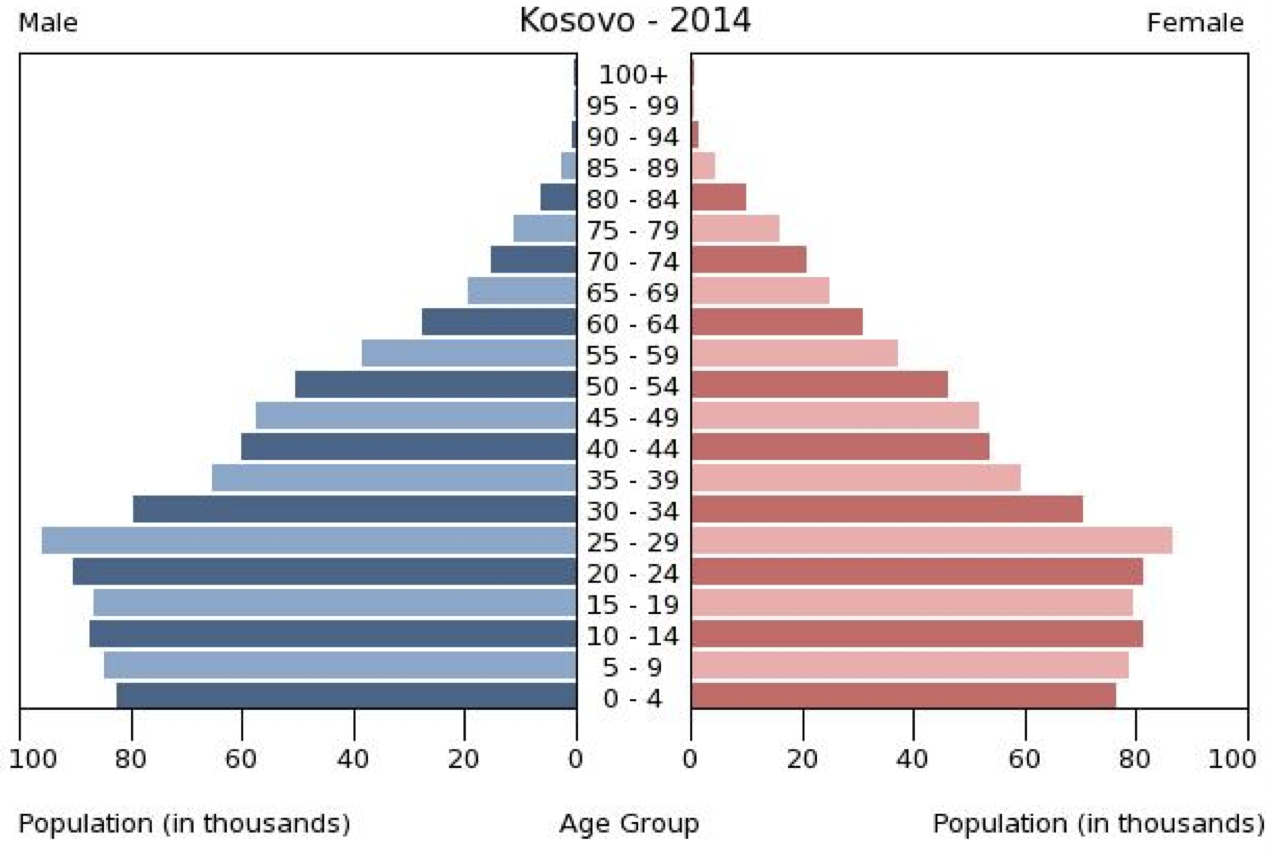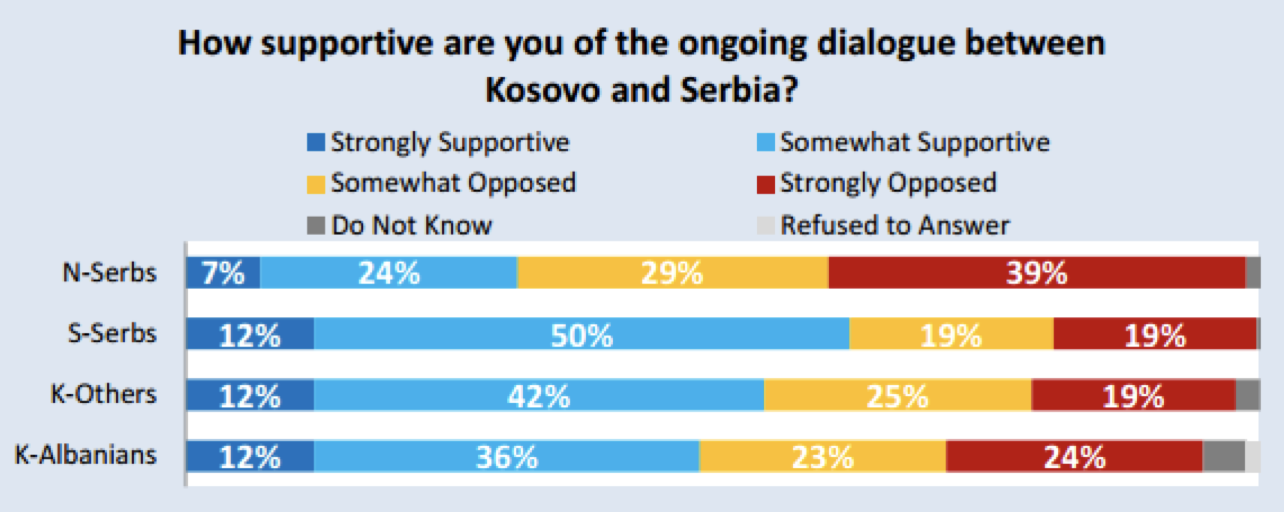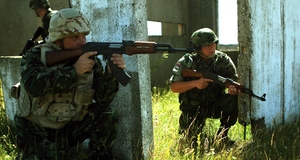Featured Article:Looking into the Crystal Ball of Kosova: Perceptions, Understandings, and Predictions of the Next Generation
By
2017, Vol. 9 No. 01 | pg. 3/3 | « Conclusion“If you really want it then you can contribute a lot...our prime minister never thought he would be prime minister at my age...you never know where you will end up” - Participant Six, personal communication, 1 December 2015 Based on the completed work, one is able to conclude that although reasons vary, overall the participants were disapproving of the Brussels Agreements. Instead of creating trust among these young adults, the talks seem to be creating doubt in the ability of the government, even extending to the point where people have begun to doubt their fellow citizens. In 2015, the negotiations have been continuing for four and a half years. The time presented may seem minimal, but for these citizens it is unacceptable to not see more results. They are now tired of waiting, and have placed the blame on many characters. The deals, intended first to relieve tension, are only making blood pressures rise. Underneath their disappointment, one can see that in the beginning many had high hopes for the talks, and even vocally supported the deals. They no longer feel this way, particularly because the country is not becoming more peaceful as a result. Instead, these dialogues are causing volatile feelings which were especially prominent at the time of this research. Two participants were open about their dissatisfaction saying they will probably leave soon. One even claimed that she will probably never return. For these citizens, the efforts of the EU, Serbian government, and Kosovar government are failing. Important to note is the fact that there were no inquiries into the knowledge these students had regarding the subject. Some stated feelings of misinformation while others were well versed in this area, therefore it could be said that some students are themselves failing by not understanding the whole intention and accomplishments of the Brussels agreement. Both of these may be true, but the bigger issue within the country may be lack of information or even too much mixed information. This is proven in this case because there was not a consensus on what is blocking peace from occurring within the country.Within their lives they have already witnessed one war, some even fled the country to escape. They all hope another war will not happen, and some firmly believe it will not. If a war were to occur, they do not even believe their own country would be able to make an impact. Their lives and hopes for the future are still reliant on the international community, specifically their neighbors in Europe. One felt fearful because of the current political conflicts now, and worries it will escalate in the future, and another thinks there is a possibility of civil war. If these fears and beliefs were to come to fruition, there would be battles over foreign policy and internal diplomacy. The past wars were about claiming one’s identity. It seems that people have now moved from dividing the lines between Albanians and Serbs, to dividing the lines between political parties. Despite this, none seemed to be invested in politics, proving that there is a group which feels caught in the middle of two sides. They were more supportive of their own generation and the power fellow students will have, and were opposed to those currently in power. Along with these findings, it is important to note that those interviewed were evenly split between men and women. All three men expressed their optimism in the future of their country, while all three women expressed pessimism in the future of their country. This is especially intriguing based on the data the NDI (2014) collected which found that “Kosovar Albanian men are more pessimistic than women, who are more ambivalent on the country’s direction,” (p. 11) which is the exact opposite of the findings from this research. Some may claim this is due to the traditional nature that still exists in Kosova, but more investigation would be needed in order to find the true source of these feelings. Although this research intended to see through the eyes of a Kosovar university student, it would simply be impossible to complete a full rounded view. Because of time constraints and limited resources, I was unable to choose students from many different areas, therefore the majority of the participants were studying subjects underneath the social sciences. For example, one professor of sociology aided this study by giving names of possible participants, which not surprisingly were students in the sociology faculty. Also, it should be noted that there are no members of minority groups interviewed in this study. This was done intentionally so as to not have one individual represent and entire, complex community. Although Kosova has been called a multi-ethnic country, well over 75% of the population falls under the category of Kosovar Albanian, which was a strong factor in choosing all of my participants. The location of my study also created limitations. Unfortunately, I was unable to interview anyone living in a rural area of the country. Those living in a cosmopolitan city such as Prishtina will have different outlooks then those living in small villages. However, due to the number of internationals living in Prishtina, there was also a higher rate of English proficiency by staying in the capital, as well as the ability to visibly see political tension and civil unrest take place. Nevertheless, the diversity of participants was narrowed. Ultimately, the biggest limitation was the barrier or language. I mentioned before that all participants were proficient in English; however, it still remains their second or third language. I was unable to complete any interviews in their native tongue due to my ineptitude in Albanian. It was also my conscious decision not to have an interpreter present so as to have the participants’ direct words for my analysis. Because of the limitations listed above, there is still more research which needs to be completed. Further investigation should be given into class differences in Kosova and how that is possibly affecting student such as these. Are students more likely to be optimistic if they come from a wealthy background? Does going to a private university such as the American University of Kosovo affect how students define peace? These would give further depth into social relations in Kosova and how they are affecting in psychology. Further research would benefit from looking into minority groups and their perceptions of peace and the Brussels Agreements, to find where they find flaws or accomplishments. Along with this it would be worth more time to study the gender dimension of the research and what the social norms are for women in Kosova that might affect their mentalities. ReferencesAbdullai, Jonuz, and Ngadhnjim Brovina. 2015. Peace-building and state-building challenges in the republic of kosovo.Revista de Stiinte Politice(47): 135-145, http://search.proquest.com/docview/1721941827?accountid=11243 (accessed December 6, 2015). Balkan Investigative Reporting Network. (2014). Big Deal: Civic Oversight of the Kosovo - Serbia Agreement Implementation. Pristina: BIRN. Balkan Investigative Reporting Network (2015). Big Deal Split Asunder: Civic Oversight of the Kosovo - Serbia Agreement Implementation. Prishtina. BIRN. Fridman, O. (2015). Unstructured Daily Encounters: Serbs in Kosovo after the 2008 Declaration of Independence. Contemporary Southeastern Europe, 2(1), 173-190. doi:3 November 2015. The Government of the Republic of Kosova. Brussels Agreements Implementation State of Play. (2015). doi:3 November 2015. Janjic, D., & Hysa, Y. (Eds.). (2011). Kosovo: Independence, Status, Perspectives: Adjusting Regional Policies of Ethnicity and Borders. Ravenna: Longo Editor. Kasic, B. (Ed.). (1997). Women and the Politics of Peace: Contributions to Culture of Women's Resistance. Zagreb: Centre for Women's Studies. Kosovo Opposition Calls ‘Peaceful Rallies’ After Violence. (2015, December 4). Balkan Insight. Retrieved December 4, 2015, from http://www.balkaninsight.com/en/article/kosovo-opposition-sets-for-peaceful-protests--12-03-2015 Lederach, J. P. (1997).Building Peace: Sustainable Reconciliation in Divided Societies(pp. 3-61, 73-85).Washington, DC: United States Institute of Peace Press. Luci, N., & Gusia, L. (2015). “Our men will not have amnesia”: Civic Engagement, Emancipation, and Transformations of the Gendered Public in Kosovo. Civic and Uncivic Values in Kosovo (pp. 199-220). Budapest: Central European University Press. Mironova, V., & Whitt, S. (2015). International Peacekeeping and Positive Peace: Evidence from Kosovo. Journal of Conflict Resolution, 1-31. Retrieved December 1, 2015, from http://jcr.sagepub.com.proxygw.wrlc.org/content/early/2015/09/15/0022002715604886.full.pdf html. National Democratic Institute. “Kosovar Attitudes on the 2013 Brussels Agreement between Kosovo and Serbia February 2014 Public Opinion Research.” (2014, February 1). Retrieved November 1, 2015. Nesovic, B., & Celeghini, R. (2015). Community/Association of Serbian Municipalities: The Sum of All Fears. Ramsbotham, O., Miall, H., & Woodhouse, T. (2011). Contemporary conflict resolution: The prevention, management and transformation of deadly conflicts. Cambridge, UK: Polity. Chapter 9 (Peacebuilding). Richmond, O. (2011). A Post-Liberal Peace. New York, New York: Routledge. Simic, O., Volcic, Z., & Philpot, C. (Eds.). (2012). Peace Psychology in the Balkans: Dealing with a Violent Past while Building Peace. New York, New York: Springer. Todoric, V., & Malazogu, L. (2011). Belgrade-Prishtina Dialogue: Transformation of Self-Interest Required. Endnotes
AppendixSources: CIA World Factbook (above). National Democratic Institute (below). Suggested Reading from Inquiries Journal
Inquiries Journal provides undergraduate and graduate students around the world a platform for the wide dissemination of academic work over a range of core disciplines. Representing the work of students from hundreds of institutions around the globe, Inquiries Journal's large database of academic articles is completely free. Learn more | Blog | Submit Latest in International Affairs |






















